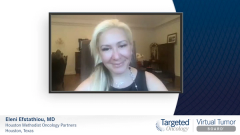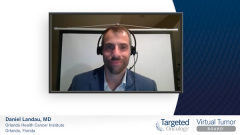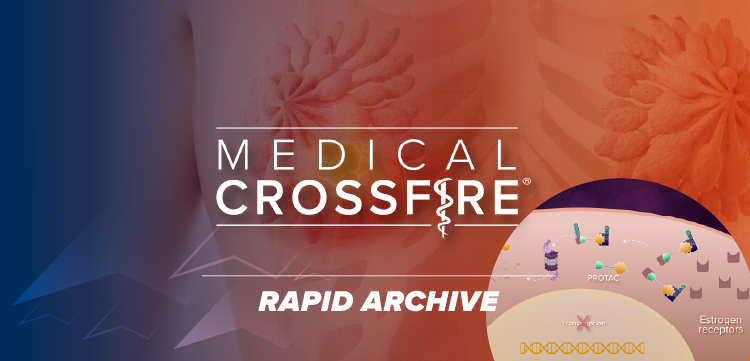
ARASENS Trial: Darolutamide-Containing Triplet Therapy for mCSPC
After reviewing data from the ARASENS trial, experts consider the role of the daralutamide-containing triplet regimen in metastatic CSPC.
Episodes in this series

Transcript:
Alan Bryce, MD: I will say, and this is a little bit different, but in the pre-triplet era in my practice, it was about 20% of patients were getting DOC [docetaxel]. The reason for that is to get the question 4, I actually do up-front germline and somatic on all these patients. And you can pick out on the genetics who the bad actors are. When you see loss of P53, when you see loss of RB [retinoblastoma tumor suppressor protein], they're headed towards neuroendocrine very quickly. And [with] those men I give docetaxel right up front. I actually use somatic testing to drive my practice. With that, I do DOC for about 20% of patients. And what I say is, conceptually, I think I start by assuming I'm going to do triplet in everybody, and then I convince myself, why am I not going to give the DOC, and I back down from there. The toxicity, the low volume, whatever it is. But the longest survival we have is with the 2 triplet regimens. I always start there and work down, if you will. And [with] most patients, I still end up at doublet. I guess just the question for genetic testing—would you both agree? We would do genetic testing now.
Daniel Landau, MD: Well, he'd be referred right away. Yes.
Eleni Efstathiou, MD, PhD: Same here. Both germline and somatic is done up-front in my clinic. Exactly for the point you made.
Alan Bryce, MD: Very good. Dan, you want to carry us forward here?
Daniel Landau, MD: Absolutely. We've finally kind of been alluding to the ARASENS trial, which was a randomized, double-blind placebo-controlled study of men with newly diagnosed metastatic castration sensitive prostate cancer [mCSPC] with acceptable ECOG [Eastern Cooperative Oncology Group] status, [with] a planned number around 1300 [which is] an ambitious number, but something we can typically fill in the prostate-cancer world, the randomization was the triplet with the ADT [androgen deprivation therapy] docetaxel times 6. And [concerning] the darolutamide, the way we would typically give darolutamide compared with ADT plus docetaxel is times 6 plus placebo. Primary end point overall survival, but a number of other end points, including time to opiate use, time to pain, time to PSA [prostate-specific antigen] progression were all secondary end points. As you would expect with a study that was nearly 1300 patients, you're going to expect a fair amount of the balance of the median age being in the mid-60s, true to our prostate cancer studies. It’s a very wide age range all the way up to 89; seeing 41- and 42-year-olds in there makes me feel terrible since I'm there; a little bit north of there. Gleason scores are greater than 8 in the majority of patients—around 3 out of every 4. PSAs, typically around the 25 to 30 range. And we see quite a bit of bone metastases, as well as visceral metastases, the ALPs [alkaline phosphatase] listed on the bottom. The end primary end point being overall survival.
We saw a difference emerge with a median overall survival in a group of patients metastatic at presentation being 14.6 months compared to 10.4 months with the placebo versus the darolutamide. Hazard ratio was 0.68, so there was about a 32% absolute difference in risk of death with the addition of the darolutamide. Amongst the secondary end points and subgroup analyses, I think, as expected, certainly if we're going to see that survival benefit, we're going to expect to see the other end points probably be favorable as well, including time to progression, time to first symptomatic skeletal event, time to subsequent systemic therapy, with everything favoring the use of the darolutamide versus placebo group. This is where I thought things looked a little bit interesting. I was alluding to this earlier, in that yes, we've had this idea of maybe starting with early docetaxel, but introducing an oral agent quickly after PSA rise, PSA progression. And as you would expect, many, many patients went on to receive either abiraterone or enzalutamide in subsequent chemotherapies higher in rate with the placebo arm compared with the darolutamide arm. There's also a little bit of lutetium that was sneaking in there, but the reason that this was of interest to me was that we suspect from some earlier publications like ENZAMET [Enzalutamide in first line androgen deprivation therapy for metastatic prostate cancer clinical trial] that's following the docetaxel very quickly with another agent.
It's not clear that that has the same benefit of doing the triplet off the back. It's still an unanswered question, but to me, in this data, what was important to see that the benefits may have persisted despite patients going on to an oral agent relatively quickly after some form of progression. As far as the adverse events to just scroll through this very quickly, you see very similar numbers on the 2 sides. Some potential adverse events of interest, including things like perhaps pneumonia, laboratory abnormalities, especially elevated LFTs [liver function tests], are very similar across the 2 sides. It did not appear that the darolutamide added much toxicity beyond what we would expect with ADT and docetaxel. There are a number of other studies in a similar setting, the CHAARTED study being an often quoted one where we really saw that benefit for the patients with high volume disease getting 15—which was for patients who were not necessarily metastatic; STAMPEDE a very complicated multi-arm study with a number of findings—and some findings are still emerging—but also the LATITUDE study with abiraterone, another arm of stamped with abiraterone; ENZAMET [trial], ARCHES [trial], TITAN [trial]. I've always been taught that the cardinal rule in oncology is comparing across studies. We cannot compare all of this data side by side and really reach conclusions based on differing patient populations. But I do feel that the results from ARASENS really speak volumes about the potential of triple therapy for these men who are metastatic at time of diagnosis.
Transcript edited for clarity.























